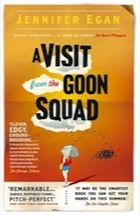 The Pulitzer Prize for Fiction 2011. Reviewers tripping over themselves to dole out superlatives. I approached A Visit from the Goon Squad expecting to be disappointed. That's the problem with over-hyped books, even if you enjoy them they tend to leave you feeling a little underwhelmed, while the books you approach with no expectations can surprise and delight you.
The Pulitzer Prize for Fiction 2011. Reviewers tripping over themselves to dole out superlatives. I approached A Visit from the Goon Squad expecting to be disappointed. That's the problem with over-hyped books, even if you enjoy them they tend to leave you feeling a little underwhelmed, while the books you approach with no expectations can surprise and delight you.But, but, for me A Visit from the Goon Squad was an unexpected delight. It quickly pierced through my 'okay, impress me' attitude. It shouldn't have worked for me - it was told from so many perspectives, there was a chapter in Powerpoint for goodness sake - but it did. Jennifer Egan's beautiful prose sucked me in and the way she writes from so many perspectives without the novel ever feeling disjointed is impressive. Within their limited allotted space in the novel each character is fully formed, believable and sympathetic. Even the Powerpoint chapter managed to convey character in relatively few words.
The story moves between characters and times, from the 1970s through to 2020. A tangle of connections hold the characters and stories together, with even minor characters having their own connections. Egan makes room in the novel for both tragedy and redemption. Characters make choices that go on to shape their lives, but while for some those become the defining moments of their lives, for others there are second chances, new connections to be made or old ones to renew.
Definitely a novel that is worth all the praise that has been heaped on it.